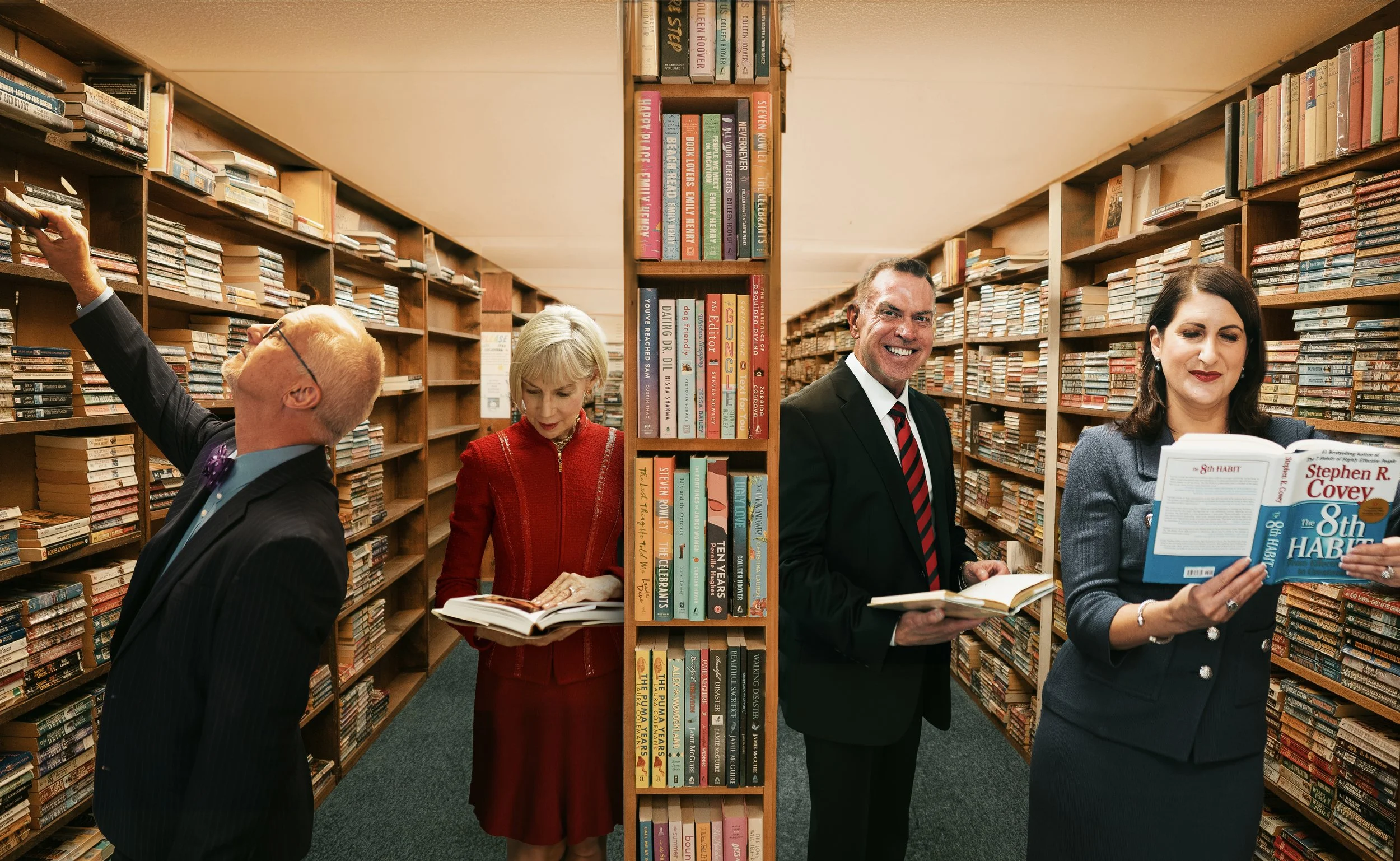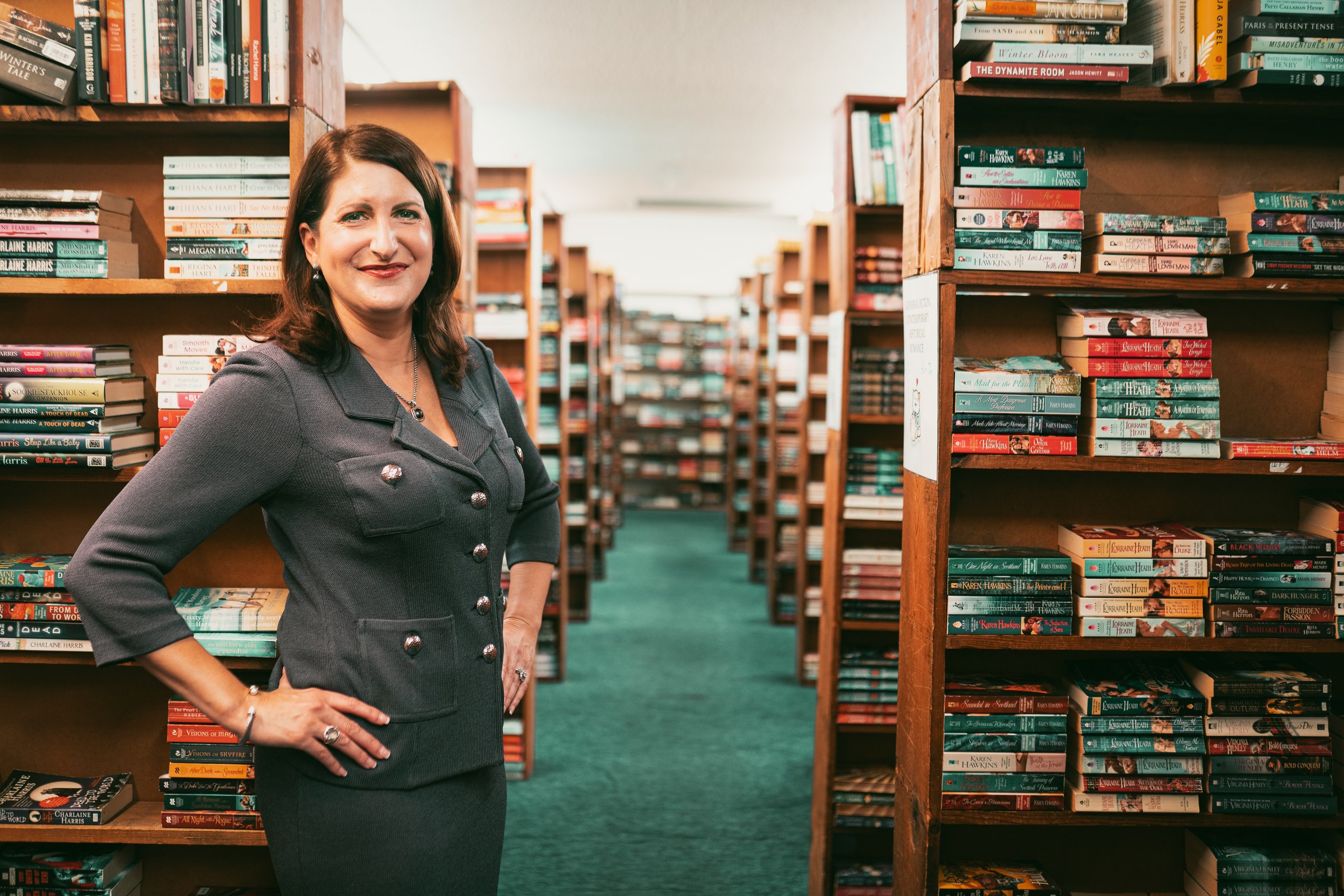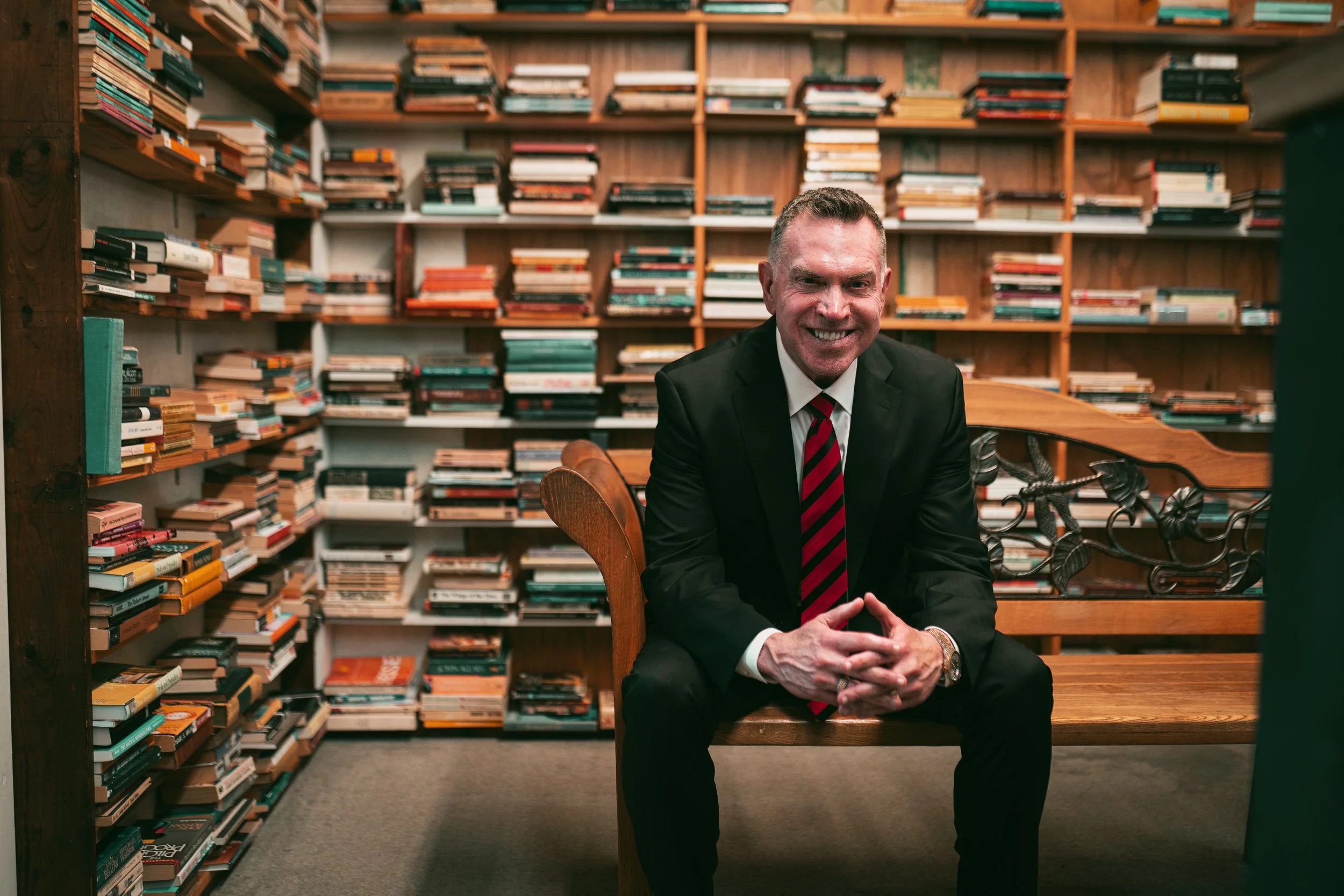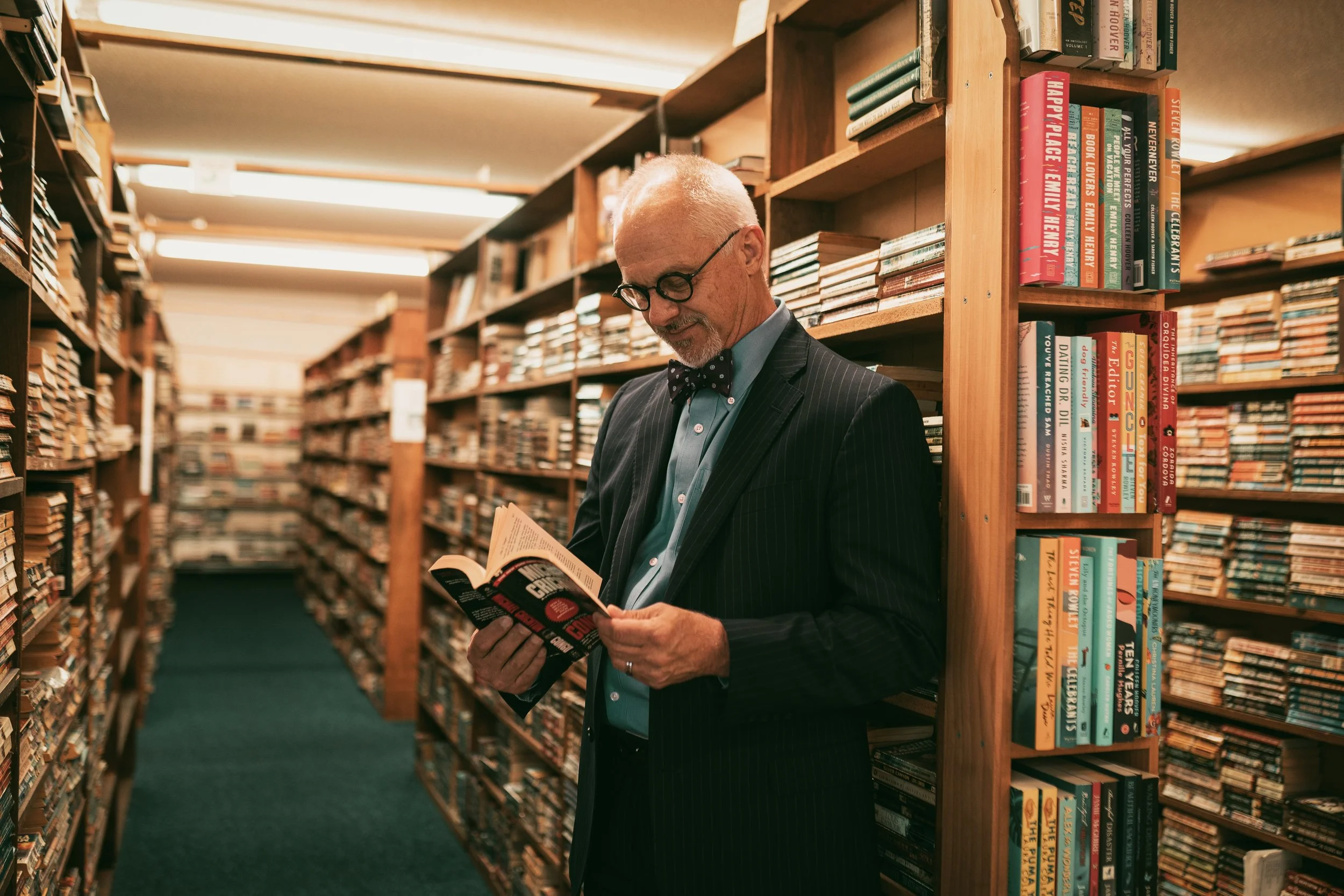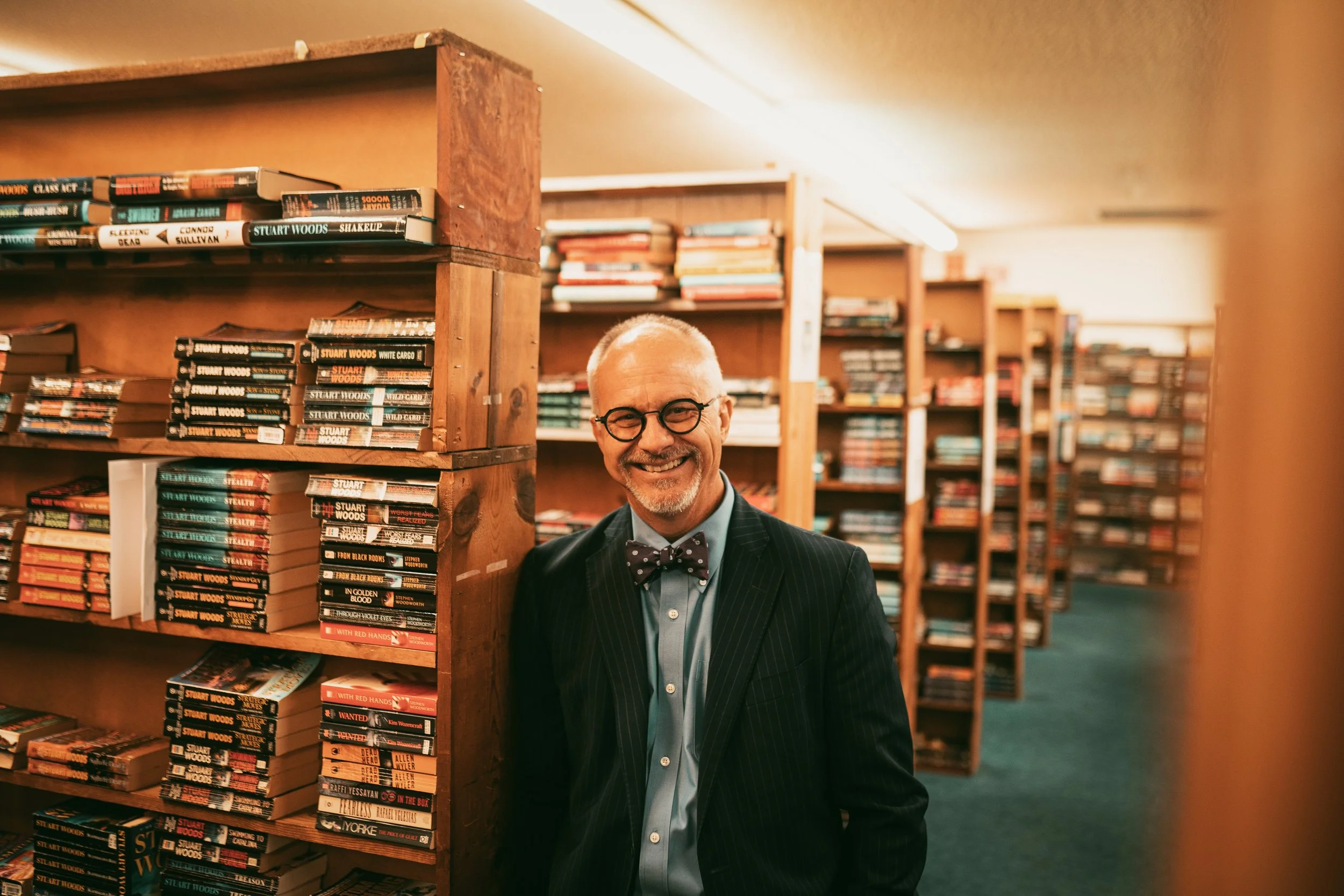Meet The Presidents
PHOTOS BY JORDAN RANDALL AND JONATHAN SIERRA ON LOCATION AT INKLINGS BOOK SHOPPE
Who is college for and how much is it worth? Which degrees are in demand and what makes one option better than another? With school back in session, join us for a visit to the library of local higher ed, where four president share what keeps them up at night and why their school is worth considering.
Polk State College
Dr. Angela Garcia Falconetti
Polk State College, President
Several years ago, Dr. Angela Falconetti was preparing for a short family trip to Disney World—a rare escape from her duties as President of Polk State College—when the phone rang. It was a lobbyist notifying her of an opportunity to testify to the Florida House at the State Capitol regarding a key funding opportunity for the school. The appointment would have to be early the next morning.
“So I got home that night, put the alarm on, packed, woke up at 3:30 in the morning, drove straight to Tallahassee, changed in a bathroom, did my hair, put makeup on and walked straight into the House building to testify, at like 9:30 in the morning,” she recounts.
The assertive 48-year old leader once listened to stories of how her grandparents fled Cuba and sacrificed so much so that future generations, like Angela’s, could have a “good life.” Today Falconetti is doing her part to make that same opportunity true for everyone in Polk County.
“‘We are Polk’ is more than the school’s slogan, it is the school’s DNA.”
“We are Polk” is more than the school’s slogan, it is the school’s DNA. More than 70 percent of Polk State graduates stay in Polk County, and more than 90 percent of students are from the area.
The school is the largest higher education institute in Polk County, now serving more than 20,000 students annually through bachelor’s and associate degree programs, as well as a wide range of certificate and workforce training options at locations like Polk State Corporate College in Bartow.
Leadership is constantly sifting through national and regional data while working to align its educational options with local employer needs. That’s why they’ve stepped full-force into a lot of nationally recognized certification and licensure programs—such as advanced manufacturing, IT, child care and more. The school is also keenly focused on programs like hospitality, law enforcement training and elementary education. It’s the reason that Falconetti has her “Eagle eye” laser focused on building the Polk State Haines City campus, which is envisioned as a new technology-powered, engaged learning environment that takes the college’s nursing and health science programs to new heights.
“[Education] can take somebody from poverty to prosperity or from prosperity to be even more prosperous...”
Polk State received $13.8 million for the project from the Florida Legislature in 2022, and a $1.7 million donation from AdventHealth provided an endowment to fund the Dean of Nursing position. Unfortunately for Falconetti and her team, the legislature vetoed their request during this year’s legislative session for $16.2 million to complete Phase I of the Haines City campus.
“Oftentimes I'll wake up at night strategizing, my mind goes ’round and ’round thinking about…what do I need to do in Tallahassee? Who do I need to meet with?” Falconetti said. “It’s a passion of mine, it's a dream. It's not just because we need a building. It's because of what's gonna be in that building. It's going to be transformational for sure for that community.”
Within a 10-mile radius of the Haines City Campus site, there are more than 80,000 residents whose highest educational attainment is a high school diploma or some college but no degree.
Falconetti readily admits the role she stepped into six years ago is deeply political, in part because about half of the college’s funding comes directly from the state. One of the reasons she said ‘Yes’ to becoming the face of Polk State is one of the primary reasons she strongly believes its best days are still ahead—an extremely committed and skilled board of trustees who utilize their connections, influence and experience to bolster the college’s position.
The board consists of Citizens Bank and Trust President/CEO Greg Littleton, Teresa V. Martinez—President and Founder of the Institute of Spanish Communication, Inc., community advocate and nonprofit leader Ashley Bell Barnett and Cindy Hartley Ross, the owner of Social Graces.
“They go to Tallahassee, they go to Washington DC and they talk to the members of Congress, and they carry a level of connection in this county that is extremely beneficial for our institution,” Falconetti said.
The Polk State College president has truly been preparing for this role her entire career too. Her educational achievements and professional accolades are enough to fill up several LinkedIn profiles, but some of the highlights include: a postdoctoral fellowship in Community College Leadership with The University of Texas at Austin while working as a research associate for the Community College Survey of Student Engagement, serving as Special Assistant to the first Deputy Assistant Secretary for Community Colleges in Washington, D.C. , serving as Vice President of Institutional Advancement at Virginia Western Community College, and most recently, serving as Chair of the Florida College System Council of Presidents.
She continues to leverage those experiences and connections to create new opportunities at a school where a student's average age is 25-26 years old. She has seen an increased need to provide more social and psychological support to a population that is still recovering from some of the impact of the pandemic. It’s all with the future in mind.
“I feel if we open the doors for individuals to pursue a higher level of education ....[it] can take somebody from poverty to prosperity or from prosperity to be even more prosperous in their lives,” she said.
She said her advice to her 12-year-old daughter Sophia about pursuing continuing education includes finding something she is passionate about and going after it, while also being realistic about what kind of long-term lifestyle that can afford her.
“Pursue a college education because no one can take that away from you, and you have something to build on.”
Falconetti admits the work is ongoing to raise the school’s profile and help locals understand that what was founded as Polk Junior College and eventually became Polk Community College until 2009 is in a new era of opportunity and anxious to prove its prowess.
But the proof of progress is all around her. At a recent Polk State College graduation, a Spanish-speaking woman pulled the President aside. Her son had just graduated with two degrees and was enlisted in the military. She asked Falconetti, “Are you the lady who helped my son?” Falconetti said that there are a lot of people who helped her son succeed, and she was one of them.
“She just started crying in my arms. She cleans homes for a living so they didn't have a lot of means to put him through,” she said. “He received employment at the college and benefited from some scholarships. That's the type of lives that we're changing.”
“Pursue a college education because no one can take that away from you, and you have something to build on.”
Southeastern University
Dr. Kent Ingle
Southeastern University, President
Dr. Kent Ingle has a gift for seeing the end from the beginning and for constructing a winning strategy that he believes will garner purposeful results.
From a young college student crafting scripts and studying shot sheets for an NBC affiliate TV station—where he interviewed global icons including Michael Jordan and Muhammad Ali—to developing attainable and repeatable leadership tactics that benefit ministry and higher ed leaders, to leading the ascension of Southeastern University as its President since 2011, Dr. Ingle is a man with a plan, or in his words, “a framework.”
His cheerful confidence and knack for defining “simple” solutions to complex challenges might make him appear formulaic at times, but the reality is he’s just really good at staying focused on how God uniquely designed him and how that translates to making transformative Christian education accessible and affordable for as many students as possible.
He credits Fred Cottriel, the pastor of the church he attended in Bakersfield, Calif., for first calling out his servant leader abilities and introducing him to the idea of “divine design”—the concept that God has uniquely created each person with distinct skills to use for a specific purpose.
“One of my favorite writers, Frederick Buechner…says, the place where you're called is a place where your deep gladness and the world's deep hunger meet,” Ingle said. “And if you follow what gives you a sense of gladness and satisfaction and joy, you're always gonna be in a place where you feel like you're making a contribution, you're creating a difference, you're leading a change.”
The change in the 12 years since Ingle took over as President of Southeastern has been seismic for the Assemblies of God affiliated institution. That change has included, but not been limited to: the addition of more than a dozen athletic teams, including a football team that was the catalyst for a state-of-the-art stadium that sits near the main campus entrance; the addition of a nursing program, the construction of a variety of modern facilities, like the 125,000-square foot Live/Learn facility Buena Vida; the launch of more than 100 SEU extension sites across the United States; and more ideas constantly being processed through the well-established framework of Ingle’s team alongside the school's board of directors.
His efforts at a respected university that was in need of renewal when he took over has pushed enrollment from 2,546 students in 2011 to more than 10,000 this school year (including 2,300+ on the main campus). Southeastern is more of a household name than ever before, in part because Ingle has an established presence on national news outlets and recently joined the Forbes Business Council.
SEU leadership frames the present and plans for the future by: listening (to students, faculty, the board, trends, etc.), auditing the context, clarifying the goals and aligning the vision.
“If you follow what gives you a sense of gladness and satisfaction and joy, you're always gonna be in a place where you feel like you're making a contribution...”
It’s no accident that the framework begins with listening. Ingle admits he is driven to learn from other people’s journeys of growth and development, from global leaders to the students on campus.
“I’ve heard many times students ask about [meeting up for] lunch or coffee...and believe it or not, I tell 'em, just reach out to my office and we can make it happen,” he said. “(Through conversations with students) we’re making sure that we're creating the right university environment that integrates faith learning in life for them…once they step out, they're not only gonna have the strong academic skills, but they're gonna have those soft skills, the emotional intelligence that allows them to really take their skills and enhance that from a relational standpoint.”
Being open for conversation has also led to new programs that Ingle said are often launched within a year or two of ideation so long as they fit the school’s vision and help it achieve its goals. An example is SEU Trades, a brand new degree and certificate program that will initially help students pursue careers in construction technology, electrical, HVAC, plumbing and project management.
“How SEU Trades really started is we received a call from John Deere and they [said], ‘We’re struggling in trying to certify mechanics across the country, and we have heard about your model and your networking in education, and how you are hitting the issue of accessibility. Would you consider partnering with us?’”
The new program addresses one of the university’s primary goals of making education more accessible, because as Ingle sees it, “Not everybody needs a degree, but everybody needs an education.”
He is also a stalwart for making higher education more affordable, stating “it’s really the university’s responsibility to drive down the cost of tuition.” On occasion you can see Ingle on Fox News sharing how SEU staff try to take scholarships to the streets instead of expecting students to come to them.
The cost of tuition to take courses at the SEU campus in Lakeland ranges between $30,432 and $32,968 per year for full-time students. Credit hours cost nearly two-thirds less at the extension sites because the university does not have “brick and mortar costs,” but those students are also not eligible for all of the same financial aid.
Ingle shares university staff are tirelessly working to bring down the out-of-pocket costs for students by directing them to scholarships and grants—such as federal pell grants—and also through establishing new partnerships with more faith-based and non-profit organizations that are looking to strengthen communities where SEU is present.
The decision makers at the university are locked in on creating an “experiential education” for students that promotes learning, living, working and serving in Lakeland. Last year, SEU students served for approximately 60,000 hours in local communities.
As Ingle keeps pushing the pedal to create what he dubs “new curves of opportunity” for students, he acknowledges that he is grateful for a team of Christ-centered leaders who keep the school’s original mission at the forefront.
“The board of trustees will always make sure…we never have mission drift,” he said.
That’s no small feat for a school that has quadrupled in size since Ingle came on board, but it’s a challenge they have certainly planned for.
Florida Southern College
Dr. Anne Kerr
Florida Southern College, President
Anne Kerr is polished and confident. She is the face of a celebrated liberal arts school with breathtaking scenery, a rich history of local support and impact, and an acclaim for developing well-rounded graduates.
Yet she acknowledges there is still much to learn—and heights for Florida Southern College to still aspire to. Now in her 19th year as President, she and her staff wrestle with challenges like helping students develop social EQ coming out of a pandemic, enhancing programs and launching new programs that are relevant to today’s job market, and standing out as a leader in hands-on learning in an increasingly screen dominated society.
The 69-year-old Kerr, who usually dons a wardrobe that includes the trademark rosy red of the Moccasins, shares it has been her ongoing mission to open new worlds of opportunity for “one of the best kept secrets in higher ed for long before she came.”
From a marketing and reputation standpoint the results of Kerr and her staff’s efforts are clear.
In 2023, U.S. News & World Report ranked Florida Southern the 8th best “Regional University in the South,” and the accolades continue to pile up.
Kerr uses the term “engaged learning” to describe how students have opportunities to learn about culture and explore potential careers up close and personal.
Florida Southern students can travel internationally as part of the Junior Journey program, and the college guarantees every student access to internships.
Kerr says the Barney Barnett School of Business and Free Enterprise, which recently was named a “Best Business School” in The Princeton Review, is a great example of an engaged learning environment in action.
“[It] is one of the best business schools in the nation based on the quality of the faculty, the curriculum, and fabulous project-based courses for our students,” she said. "We have a wonderful dean, Dr. J. Michael Weber, who leads the enterprise, and the School is not only a benefit to the students who go through there, graduate, and are very successful, but also, it is a great asset for our community.”
Business students get to learn from guest lecturers from around the world and build relationships with some of the most influential local business leaders, through events like the Polk Real Estate and Economic Update that the college hosts annually. Business college students are earning internships at distinguished entities like Bank of America, FedEx, Goldman Sachs and Publix.
Florida Southern has also made a name for itself through the Ann Blanton Edwards School of Nursing and Health Sciences, where students can earn bachelor’s, masters and doctorate degrees. Students work in simulated lab settings with high-end technology and have opportunities for hand-on clinical experience at myriad healthcare providers in Central Florida.
Education and other “traditional” majors continue to blossom at FSC, but its school of arts and sciences offers more than 35 majors, many that represent significant shifts toward technology-focused careers.
“We have a dynamic computer sciences department, and students are very interested in cybersecurity, AI, and many other aspects of technology management. Our pedagogy in some disciplines is changing in exciting ways,” Kerr said. “We have faculty members who are now using gamification pedagogy because it’s fun and incredibly effective for this generation of students.”
Kerr uses the term “engaged learning” to describe how students have opportunities to learn about culture and explore potential careers up close and personal.
The rise of the state’s oldest four-year college coincides with a continual rise of the cost of attending the school.
Tuition for a full-time student during the 2004-05 school year ranged from $16,680 to $18,240 for a full-time student, according to The Ledger. The tuition for the 2023-24 school year is $42,360.
Kerr acknowledges the cohort of students Florida Southern attracts are usually already committed to attending college and FSC “helps formulate that dream for the student.”
Still, she says one of her main goals currently is to raise more funds to provide more scholarships—something the school states it does to the tune of more than $52 million per year currently.
“It deeply troubles me when we have talented students who want to enroll or can't continue here because they don’t have the financial resources to do so,” she said. “I admire students who work and attend FSC.”
Funding and growth aside, Kerr said the thing that perpetually keeps her up at night is student safety. She said “no college president has been the same” after a gunman killed 33 people, including himself, on the campus of Virginia Tech in 2007.
“From comprehensive emergency response plans to mental health and counseling services, we have made significant strides in ensuring student safety.”
She said she is grateful for the experienced leadership of Head of Security Eric Rouch and the tight partnership they have with Lakeland Police Department who provides 24/7 coverage for the campus.
“I always question, and pray for our students and our campus every night,” Kerr said.
Prayer has long been a common practice of students and faculty alike at the college that was founded by the United Methodist Church. Kerr says there is a “deep thread of spirituality” at the school, including the Christian campus ministries and chapel, a Hillel program for Jewish students and more.
Something else that Kerr counts on to help center her amidst the noise and responsibility of being a college president is her horses. She and her husband, Dr. Roy Kerr, own four horses, a passion which was awakened when a dear friend invited her to her horse ranch years ago.
Not surprisingly, Kerr enjoys participating in horse shows—just a little extra competition for someone who is built for adventure.
Florida Polytechnic University
Dr. Randy Avent
Florida Polytechnic University, President
He has one final lap—the curves, the “whoops,” the stiff competition—in him before he truly rides off into the sunset. When Randy pulls up on his bright orange KTM dirt bike, you’d think he’s just one of the guys when he removes his helmet and starts talking about fixing up his dad’s old truck or a woodworking project he’s finishing. But if you saw him the next business day the helmet would be replaced with studious glasses, he would probably be donning a suit and sharp purple tie, and if you were fortunate enough to have reserved some time with him in his office, you would be trading wisdom with the first and only president of his kind.
Some will remember the long and sometimes contentious process that preceded the founding of the state’s 12th public university. It was a show of political fireworks involving then Senate budget chairman JD Alexander and his plea to turn Florida Polytechnic—then a branch of the University of South Florida—into a standalone STEM focused institution in rural Polk County.
Florida Polytechnic has quickly, if imperfectly, become an innovative, hands-on learning research university that has partnerships with Mosaic, Lockheed Martin, Cisco and more. It is a career runway for students that the Tampa Bay Business Journal reported produces graduates who have median earnings of $57,900 one year after graduation, 35% higher than the average public school graduate in Florida.
The first class of students at Florida Poly was 554 students during the fall of 2014, and Avent said there were around 30 employees when it launched, including roughly 10 faculty. Today, enrollment is at more than 1,500 undergrad students, and the school website states more than 150 staff and 73 faculty work there.
It’s been a wild ride to get there.
“There were six legislative mandates that had to be met, and when Ava Parker (now the president of Palm Beach State College) walked in as [the first] employee, she had a year and a half, and she had to hire anybody she could,” Avent recalls. ”Ava got the university ready to open just by her sheer power and devotion to the university.”
Avent remembers “100-hour weeks” early on, and it was an unheralded challenge for a brilliant scholar who worked for Massachusetts Institute of Technology (MIT) for nearly two decades, at one time served as a chief scientist for the U.S. Department of Defense, and who said he was once happiest with “his door shut, solving technical challenges and writing papers.”
“I never imagined that I would be able to help establish a brand-new STEM university...”
Yet, when he released a public letter on July 24 stating he would be stepping down as President at the end of the 2023-24 school year, it signaled the accomplished 65-year-old father of three realized he has grown exponentially as a leader by taking on this challenge.
“I never imagined that I would be able to help establish a brand-new STEM university and mold the way it would serve students, industry and the entire state,” he wrote in a 411-word message sharing his plans to transition to a faculty role.
He and his staff had to prove the credibility of the institution early on, and they led Florida Poly to its regional accreditation from the Southern Association of Colleges and Schools Commission on Colleges in 2017 and its critical ABET Accreditation in 2019.
The infrastructure has followed.
The 90,000 square foot state-of-the-art Applied Research Center opened last fall, a third student residence hall is under construction and a new engineering building is in the works to break ground this fall.
Additionally, the Global Citrus Innovation Center opened, the fruit of a momentous public-private partnership with Fortune 500 company International Flavors and Fragrances (IFF). Avent has long held the vision of building a research park for public-private partnerships on open land within miles of the university, but he acknowledges it has progressed slower than he hoped.
“Polk County’s not gonna get anything out of this university if we can’t start attracting some high tech economies.”
“One of the things that keeps me up at night is how many warehouses [that are being built on nearby land] because they are really going to shut the door on that opportunity,” he said.
Avent said the university graduates 300-400 talented students each year, but “they all leave Polk County” because high-tech jobs with competitive wages and growth opportunities are not currently part of the area’s infrastructure.
“Polk County's not gonna get anything out of this university if we can't start attracting some high tech economies,” he said. He’s not completely pessimistic, noting the domino effect that hopefully started with the IFF partnership and mentioning the impact he expects to see from SunTrax—a 400-acre site that involves a partnership with Florida Poly and the Florida Department of Transportation that will develop and test emerging technologies that improve and advance transportation.
Avent is proud that he leads a university where they “teach theory, not technology.” He says STEM is not just about buzz categories like 3D printing and robotics, it’s foundationally about understanding hard math like triple integrals on closed contour surfaces and being able to determine whether sequences converge or diverge.
Florida Poly challenges students to not only be great at solving complex problems, but also to be comfortable working on teams and presenting their findings to peers, skills that enable them to be more career ready.
“You know, the old joke, ‘How do you tell an engineer is extroverted?’” Avent quips. “He looks at your shoes when he talks to you.”
To combat some of the stress related to his job, Avent truly did return to one of his pastimes of yesteryear, connecting with a group of Florida Poly students along the way.
He rode dirt bikes all through high school, and then picked the hobby back up when his kids wanted to ride. But ever since, he had only daydreamed about it on occasion.
Then one day, a former student government president showed off a picture of his new street bike to Avent. Avent advised against it because of how dangerous they are, and the young man said his grandparents echoed that sentiment so much that they told him they would buy him a car if he sold it.
“I said...you take them up on that deal, and then go out and buy a dirt bike,” Avent recalls.
One thing led to another. The student did purchase a dirt bike and invited the President out for a spin. Avent rekindled his love for racing at spots like Croom State Park and Bone Valley—often riding with several students—and eventually purchased a couple of KTM bikes to race in hair scrambles and enduros.
For a leader who has helped cast the vision for an institution that has the power to impact generations, it’s something exhilarating that allows him to live in the moment without getting lost in the details.
“On a dirt bike, if you're not worried about the 10 feet in front of [you], you're gonna pay for it,” he said.

